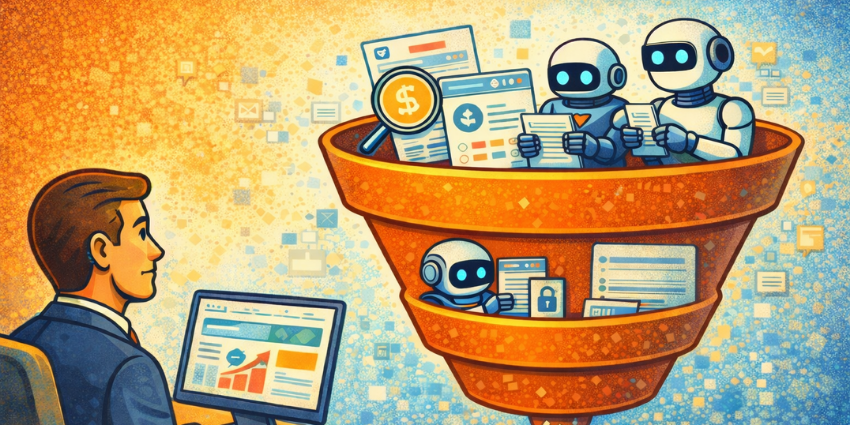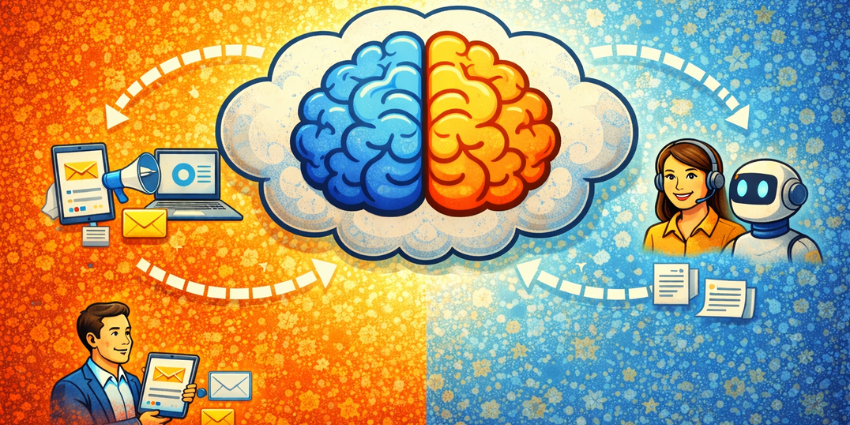It’s easy to think of CRM software as a relic of the early 2000s, something built for managing contacts, tracking sales, and sending reminders to follow up. That was the original pitch, but the answer to “What is CRM?” is changing.
CRM systems are now the platforms that keeps companies connected to their customers, even when those customers move across five different channels in a single day. It’s the central nervous system for teams that need to stay aligned, sales, service, marketing, operations.
Enterprise teams are already connecting CRM platforms to things like CCaaS and CPaaS tools to create real-time workflows across voice, messaging, and chat. Add a customer data platform to the mix, and suddenly every interaction is personalized, contextual, and consistent.
What Is Customer Relationship Management (CRM)?
CRM is an acronym used to refer to “Customer Relationship Management.” It describes the tools, technologies, and strategies companies use to manage their customer interactions and data throughout the entire lifecycle. That definition still checks out, but today, the job of a CRM strategy is bigger.
The goal is to enhance relationships with buyers, foster retention, and increase lifetime value while giving companies a holistic view of their target customers (and their needs).
Yet, when most people ask: “What is CRM?” they’re usually talking about CRM systems: the software businesses use to align and track customer interactions and actions.
Today’s CRM systems ensure businesses can store critical customer data – which includes everything from social media interactions to purchase histories and service outcomes – in the same place. They often align with CCaaS platforms, ERP, WEM, and other crucial business tools.
They also include aligned features for:
- Contact and Account Management – Names, emails, touchpoints, sentiment—all in one place.
- Sales Pipelines – From lead to deal to closed-won, complete with forecasting and velocity metrics.
- Customer Service Tools – Case tracking, SLA management, omnichannel visibility.
- Marketing Automation – Journey triggers, personalization rules, performance tracking.
- Reporting and Insights – Dashboards that flag trends, gaps, and revenue risks in real time.
From this centralized hub, sales, marketing, customer service, and other departments get the insights they need to deliver better customer experiences, reduce turnover, and improve business outcomes.
In 2025, most CRMs are built with AI at the center. That means lead scoring based on behavior, content recommendations that update on the fly, and service alerts triggered before problems escalate. The software isn’t just logging what happened, it’s predicting what’s coming next.
How Do CRM Systems Work?
Customer relationship management has come a long way since the early days of on-premises systems that acted like a digital Rolodex of contact details and information.
Today, effective CRM processes combine automation, cloud-based integrations, AI, and machine learning to support every customer-facing team.
Here’s what’s actually happening behind the scenes.
Data Comes First
A good CRM system picks up data from almost everywhere: emails, chat conversations, phone calls, web visits, even social media clicks. If someone searches a product five times in a week, the CRM knows.
For instance, the CRM logs each visit if a prospective buyer repeatedly searches for a particular product on your website. That kind of detail helps sales teams figure out who’s ready to buy, and helps marketing tailor what to send next.
CRMs that plug into CCaaS platforms and Business Intelligence suites. Some flag tone or sentiment mid-conversation. Others route tickets based on urgency or priority.
Everything Gets Stored in One Place
Once collected, customer data is stored in a unified database, accessible to various departments, such as sales, marketing, customer service, finance, and even product development teams. Some CRM vendors are taking their technology to the next level, creating customizable customer data platforms that connect insights from various different touchpoints.
No more chasing down spreadsheets or messaging someone in sales to ask, “Has anyone talked to this person before?” The answer’s already there. Teams work from the same playbook, whether they’re onboarding a new account or trying to fix a renewal issue.
Automation Handles the Repetitive Stuff
One of the most transformative elements of a CRM system is the capacity for automation. It’s not just about saving time. It’s about making sure nothing gets missed.
Follow-up emails? Handled. Lead routing? Done. Categorizing contacts by interest or location? It’s all set up in advance. Simple but time-consuming tasks, like scheduling follow-up emails or categorizing leads by interest, can be put on auto-pilot.
Reporting and Analytics
CRMs equip businesses with dashboards and data visualizations that make sense of extensive customer information. But the good ones don’t just show charts. They flag problems before they escalate. If a certain product’s seeing a spike in support tickets, it shows up in real time. If a campaign’s working, the dashboard shows who’s clicking and converting.
These insights boost decision-making. Some platforms even go further, using predictive analytics to suggest when to launch a promo or when to push a product update.
More Than a Database
Many modern CRM platforms also include various advanced features, such as project management tools, workforce optimization integrations, and integrations with other software, such as Enterprise Resource Planning (ERP) and contact center systems.
All of that means better visibility, better timing, and fewer surprises.
Who Is Involved In Customer Relationship Management?
In the past, companies often assumed that CRMs were just for sales teams that needed help tracking leads and automating follow-up or qualification tasks.
However, customer relationship management is a multi-departmental process. For instance:
Sales Teams
Sales teams rely on CRM to see the full story. Who opened the proposal? Who visited the pricing page twice last week? What accounts are stuck in the same stage for too long?
Everything’s tracked. That means reps can skip the small talk and get to what matters, whether that’s pitching the right product or walking away from a deal that’s clearly gone cold.
Sales teams also use CRM solutions to track customer interactions, automate parts of the sales cycle, access data to create personalized pitches, and identify opportunities.
Marketing Teams
Marketing teams pull CRM data into every campaign. Want to launch an email blast to enterprise buyers in finance who haven’t converted? Or send a follow-up offer to people who clicked but didn’t buy? It’s all right there.
Some CRM solutions come with built-in generative AI to automate marketing tasks (like email or social media campaigns), create profiles for campaigns, and monitor marketing results.
Because the CRM sees what sales and support teams see, marketing messages can match the customer’s real experience, not just their segment.
Customer Support Teams
No one wants to repeat themselves five times on a support call. CRM systems help make sure they don’t have to. Agents can see ticket history, sentiment scores, previous purchases, everything. It speeds up resolution and makes conversations more human.
For simple requests, CRM systems connect with bots and knowledge bases to automate answers. Customer service teams rely on CRM systems to automate contact center tasks (like answering FAQs with bots or creating knowledge base articles). They use CRMs to provide seamless, personalized support across channels.
Find the top conversational AI platforms to plug into CRM processes here.
Commerce Teams
The same engine that powers a sales email can also drive what someone sees on an e-commerce site. When a CRM connects with commerce tools, product recommendations get sharper, upsell timing gets better, and abandoned cart reminders feel less generic.
Commerce teams enhance online shopping experiences with CRM-powered applications and bots that deliver personalized recommendations to customers.
Bots can even step in during checkout to offer help or suggest a bundle based on what someone’s bought before or how long they’ve been a customer.
Product Teams
A good CRM doesn’t just collect feedback, it shows trends. Product teams can see what features get requested most, what issues trigger the most support tickets, and where customers tend to churn.
Product teams use CRM data to identify opportunities to create new products, increase sales, or optimize the features of existing solutions based on customer feedback.
That kind of insight helps teams prioritize what to fix and what to ship next, significantly increasing revenue and conversions.
HR Teams
This one surprises people. But HR teams inside large service organizations use CRM data all the time. It helps track agent performance, spot training gaps, and see where staffing levels need to shift. That’s especially true when CRMs are integrated with workforce optimization platforms.
HR teams track CRM data to optimize resource allocation strategies, identify training opportunities for team members, and conduct performance reviews.
If a region is struggling to hit response-time SLAs, CRM dashboards usually show it before complaints start rolling in. That lets HR and operations fix the issue before it hits the customer.
Who Needs Customer Relationship Management?
For today’s organizations, the question isn’t just “What is CRM?” But: “Do I actually need CRM solutions?”
The simple answer is that virtually every company, no matter its size or industry, can benefit from customer relationship management.
Here are some core signs that a company really needs a CRM strategy:
- Growing Complexity: If an SME (small or medium-sized enterprise) is transitioning from spreadsheet-based customer logs to handling hundreds of leads each month, a CRM might be the difference between chaos and clarity.
- Scalability: Enterprises that expand geographically often need a centralized system so remote teams stay aligned. CRM solutions can help bring your team together, eliminate data silos, and empower hybrid and remote teams with unified data.
- Increasing CX Demands: In an era where 79 percent of customers expect personalized interactions (according to a recent McKinsey report), businesses increasingly rely on CRMs to deliver fast-paced, efficient, and tailored support.
- Evolving Employee Experiences:CRM systems don’t just foster collaboration among teams. They improve the employee experience in various ways. With a unified ecosystem, teams waste less time searching for information. Plus, they have access to advanced AI and automation tools, cutting down on repetitive tasks.
- Growing Reporting Requirements: CRMs provide comprehensive reporting capabilities, offering insights into sales performance, customer behaviors, and overall business health – crucial for presentations to investors, board members, and other stakeholders.
The Key Benefits of CRM Solutions
Enterprise tech stacks are crowded. Large companies run on hundreds of apps, sales tools, support systems, marketing platforms, analytics dashboards, the list goes on.
But when those tools don’t talk to each other, everything slows down. Teams miss signals. Customers get duplicate emails or inconsistent answers, and opportunities slip through the cracks.
That’s where a solid CRM strategy backed by the right technology comes in. CRM systems don’t just store data, they connects the dots across teams, departments, and touchpoints. They turn siloed tools into a shared operating model and gives every part of the business a real-time, unified view of what’s happening with the customer. Teams benefit from:
Improved Organization
When all customer data is aligned in one place, aligned with ERP systems, WEM, and other contact center tools, companies get a clearer view of the business, their customers, and the existing opportunities. They can personalize interactions, improve efficiency, and make better data-driven decisions.
Enhanced Personalization
Every department, from marketing to finance, can use CRM tools to view a customer’s preferences, purchasing histories, and feedback. They can then use this information to enhance interactions with personalized support and guidance.
Smarter Decisions
CRM solutions help companies track their progress toward high-level goals and make more intelligent decisions. Some CRM tools even have AI solutions that can identify patterns and introduce teams to new opportunities. Others include integrations with tools for gathering VoC feedback, for deeper insights.
Boosted Customer Loyalty
Loyalty is about reliability, relevance, and delight. A CRM ensures that each touchpoint reflects the customer’s history and preferences, making them feel valued. By automating follow-ups or loyalty offers, brands keep customers engaged and less likely to wander to competitors. Some vendors even offer integrations with comprehensive loyalty management platforms.
Simple Scalability
Ramping up operations without a central system can cause significant headaches. A CRM readies a business for growth by automating admin tasks, centralizing customer data, and aligning team efforts.
Stronger Collaboration:
A CRM erodes departmental walls. When sales, marketing, support, and product teams use the same hub, they can share insights instantly. For example, if the support team flags repeated feedback on a feature, marketing can highlight that improvement in the next campaign while product teams work on a permanent fix.
Profit, Efficiency, and Sustainable Growth
Beyond all the day-to-day wins, the long game is about outcomes. Companies that lean into CRM solutions often see stronger profitability and lower costs. Because the software helps people spend less time chasing information and more time delivering value.
In the end, a real CRM strategy isn’t about the software. It’s about putting the customer at the center of how the business operates, and staying there as it grows.
Features to Look for in Enterprise CRM Software
Most CRM tools look good on the surface. Clean UI. Nice charts. A few automation options.
But enterprise buyers need more than a good-looking dashboard. For companies asking “what is CRM software?” the next question is often “Which features really matter?”
Here’s what separates a real enterprise CRM from a lightweight tool.
- Customization Without the Complexity: Every business has its quirks. The best CRM systems don’t force teams into rigid workflows. They let users tailor the experience, custom fields, pipeline stages, deal structures, dashboards, without breaking things.
- Seamless Integrations: A CRM system isn’t an island. It needs to plug into the tools teams already use, email, calendars, finance software, ERP platforms, CDPs, support ticketing systems, and more. APIs, pre-built connectors, and webhook support are all crucial.
- Built-in Automation: Admins shouldn’t spend half their day creating workflows. And reps definitely shouldn’t waste time doing things the system could’ve done for them. Enterprise-grade CRM software should automate repetitive tasks like lead assignment, task reminders, follow-up emails, and quote approvals.
- AI That Does More Than Just Predict: Plenty of platforms throw “AI-powered” into the mix. Few deliver real value. The best CRM solutions don’t just surface data, they tell teams what to do with it. That could mean highlighting churn risk, suggesting a next-best action, or flagging deals that are starting to go cold.
- Real-Time Reporting: Static spreadsheets don’t cut it anymore. Decision-makers need real-time visibility, what’s closing this month, where leads are dropping off, which reps need support. Good CRMs offer dashboards that forecast growth, spot market shifts, and guide investments.
- Enterprise-Grade Security and Compliance: Large companies need tools that are built with privacy, compliance, and security at the core. That means GDPR and CCPA readiness, SOC 2 or ISO certifications, and that means role-based permissions, audit logs, and customer data protections.
What is CRM? The Top CRM Providers
There are countless global CRM system providers, from well-known market leaders like Salesforce and HubSpot to up-and-coming niche players. Some of the most prominent CRM providers include:
Salesforce
Salesforce is often credited with bringing cloud-based CRM solutions to the masses and still leads the space in terms of market share.
Today, its Customer 360 CRM apps cover sales, marketing, service, and commerce, with industry-specific offerings, too.
Salesforce is also leaning further into the AI space, embedding Einstein AI across its apps and releasing Agentforce for agentic AI development.
Finally, Salesforce offers a robust AppExchange marketplace, where companies can find thousands of apps, extensions, and integrations to optimize their CRM strategy.
Microsoft Dynamics 365
Microsoft Dynamics 365 stands out by seamlessly integrating with various Microsoft applications, such as Outlook, Teams, and Power BI.
Businesses already investing in Microsoft’s ecosystem can slot Dynamics 365 into their existing workflows without extensive disruption or complex set-up processes.
Microsoft’s CRM tools benefit from access to Copilot AI and autonomous agents that can handle a range of tasks for customer-facing teams.
Plus, Dynamics has modular apps for sales, marketing, and customer service. All these apps come together within a single ecosystem.
HubSpot CRM
HubSpot CRM gained rapid popularity as a marketing CRM. However, it’s now a fully-fledged CRM platform with a multi-hub strategy to rival the likes of Salesforce and Microsoft.
A critical differentiator is in its freemium model, which is highly scalable and attractive to smaller, agile businesses.
Indeed, the pricing model makes HubSpot particularly attractive to start-ups, small businesses, and those wanting to dip their toes into CRM without substantial upfront costs.
HubSpot is also one of the more user-friendly CRM solutions, with plenty of great resources for beginners built into the HubSpot ecosystem.
Zoho CRM
Zoho CRM is part of Zoho’s expansive suite of applications, which covers tools for everything from bookkeeping to human resources.
By integrating these various modules under one umbrella, Zoho appeals to businesses seeking a cohesive “one-stop shop.”
Zoho CRM combines intuitive contact management with automation and AI-driven insights, making it suitable for both niche ventures and large-scale enterprises.
Additionally, teams can manage projects, support tickets, sales pipelines, and email campaigns without leaving the Zoho environment.
Zoho Analytics (previously Zoho Reports) plugs directly into Zoho CRM too. This offers companies real-time dashboards that track everything from monthly deal closures to top-performing territories.
Oracle NetSuite
Oracle NetSuite distinguishes itself by fusing CRM functionality with enterprise resource planning (ERP).
In taking this more integrated approach, Oracle allows businesses to manage finances, inventory, and customer relationships within a single platform. That’s ideal for companies needing real-time visibility across front- and back-end operations.
NetSuite captures much of the entire customer journey, from first touch through payment, order fulfillment, and ongoing support. All these processes run on the same database, eliminating data silos.
For international enterprises, NetSuite’s support for various currencies and tax regulations provides a practical way to maintain compliance.
What is CRM for the Future? Emerging Trends
A few years ago, most CRM systems were still just digital notebooks, fancy places to store contact info and meeting notes. That’s changed fast.
Today, AI in CRM isn’t some experimental add-on. It’s built into how the smartest companies manage relationships, track deals, and deliver service. The platforms that lead in this space aren’t just collecting data, they’re acting on it.
Here’s what AI-powered CRM software is doing right now, in real enterprise environments:
- Lead scoring that evolves on its own. Instead of relying on rigid rules (“score +10 if email opened”), AI tracks behavior and outcomes over time. It learns which actions predict revenue and prioritizes leads that actually convert.
- Suggested actions in real time. Some systems flag when a deal’s gone quiet, or when a support interaction needs escalation. Others help reps write follow-ups with auto-drafted copy based on tone and topic.
- Forecasting that gets smarter with every quarter. AI picks up seasonal patterns, regional differences, and outliers. The result? Better sales predictions, with less guesswork.
- Next-best offer and cross-sell recommendations. Based on past purchases, product usage, or support tickets, the system knows what might land next and when to suggest it.
AI isn’t the only CRM trend gaining steam. Modern platforms include:
Advanced Automation Options
Reps shouldn’t be manually updating contact records. Agents shouldn’t waste time routing tickets. Leaders shouldn’t dig through five tools to figure out what’s happening this week.
That’s what CRM automation handles behind the scenes:
- A support case gets created from a chat.
- A prospect gets an automated nudge after a webinar.
- A closed deal triggers onboarding workflows across departments.
Agentic AI is also paving the way for digital agents that can handle everything from updating records to following up with customers automatically.
Hyper-Personalization at Scale
Every customer wants to feel known, but no one has time to handcraft every email or call script.
With AI and real-time behavioral tracking, modern CRM systems can tailor interactions based on product usage, survey responses, support history, or even tone of voice.
The result? Messages that feel 1:1 and human, even when they’re handled by conversational AI tools.
Predictive and Preventive Service
CRM is moving into service territory fast. Not just answering tickets, but predicting churn, flagging account risks, and alerting teams before problems escalate.
Some systems can even detect frustration in customer language with sentiment analysis and trigger follow-ups automatically. That’s where AI meets empathy, and where loyalty is won.
Voice and Conversational Interfaces
Typing is optional now. Many platforms are experimenting with voice-to-CRM input, letting reps log notes on the go or trigger actions through conversation.
It won’t replace keyboards entirely, but for field sales or on-the-floor service teams, it’s a valuable step forward for user experience.
Low-Code, No-Code Customization
More CRM platforms are giving teams tools to build their own automations, dashboards, and workflows, without needing engineering resources.
That flexibility matters. Because when the market changes (and it always does), the system needs to change with it. Companies can also more easily connect their CRM systems to the tools they already use, from WEM platforms, to feedback management tools, and business intelligence apps.
Choosing the Right CRM for Your Business
Not every CRM fits every business. What a boutique agency needs won’t resemble what works for a global insurance provider. One’s running lean, the other’s juggling compliance, territory rules, and a contact database the size of a city. Enterprise leaders should prioritize:
- Function Over Flash: Plenty of demos look great. Clean interfaces, color-coded dashboards, drag-and-drop everything. But when things get complex, multi-step approvals, cross-regional workflows, multiple currencies, it’s not the interface that carries the weight. It’s whether the system bends or breaks under pressure.
- Integrations: A CRM that doesn’t sync with core systems isn’t a CRM, it’s a data silo in disguise. The marketing platform, ERP, support desk, and product analytics tools all need to connect without a month of custom engineering. If data has to be exported, restructured, and uploaded manually, the system’s already behind.
- Scalability: Every company talks about scaling. Fewer talk about shifting. And yet priorities shift constantly, new products, new regions, leadership changes, regulatory pressure. When those shifts happen, the CRM should be able to pivot with them. That might mean spinning up new workflows. Or adjusting access for a growing team.
- Real Security: If customer data flows through the CRM, security and compliance have to be baked in from the start. That means encryption everywhere, audit trails that hold up to scrutiny, and permission structures that aren’t a nightmare to manage.
- Vendor Support: Who owns implementation? Is support reactive or proactive? Can the team pick up the phone and talk to someone who knows the account? Buying CRM software is a long-term relationship. It’s worth knowing who’s on the other side of it.
What is CRM? The Heart of Better CX
Customer relationship management is often the key to running a successful business in any industry.
It’s a framework for capturing and analyzing customer insights, building loyalty, and ultimately driving revenue.
CRM transforms fragmented interactions into meaningful, one-to-one relationships by centralizing data, automating menial tasks, and unifying teams around a shared view of each customer.
For enterprises that want to grow smarter, faster, and more sustainably, the question isn’t whether to invest in CRM software. The only question is: which one will do the job right?
Ready to upgrade? CX Today is here to help:
- Join the Community: Be part of a dynamic CX-focused community. Share insights with thought leaders, and get tips on your CRM strategy.
- Test the Tech: Meet the leaders in the CRM landscape, explore new technology offerings, and learn about the trends shaping the space at upcoming events.
- Plan Your Next Purchase: Explore the CX Today Marketplace for insights into the top CRM vendors, CDP solutions, and CX tech.
Alternatively, visit our ultimate CX guide, for everything enterprise leaders need to know about the technologies, processes, and strategies driving better customer experiences.
FAQs: What is CRM?
What is CRM?
It’s basically a place where teams track everything about customers, calls, emails, past orders, whatever matters. It helps people remember who they’re talking to, what’s already happened, and what should probably happen next. That’s all it is, really.
What does a CRM system do?
It keeps things organized. Notes, conversations, deals, tasks, everything tied to a customer lives in one spot. So when someone picks up the phone or replies to an email, they already know the backstory. That’s the real value.
How is CRM used in business?
Sales uses it to stay on top of deals. Marketing builds lists. Support pulls up history. Sometimes even product or HR gets in there. Different teams, same tool. Everyone sees what’s going on without asking around.
How is CRM different from ERP or CDP?
CRM is about conversations and follow-ups. CDPs handle customer behavior data, web activity, clicks, stuff like that. ERP is more about operations, finance, inventory, logistics. They all help run the business, just in different corners of it.
Is CRM just for sales?
Not anymore. That’s where it started, but now marketing uses it, service teams rely on it, even leadership checks reports. Any team that talks to customers, or makes decisions based on what they want, can use CRM every day.
What does AI do in CRM?
It’s helpful, if done right. It might suggest next steps, score leads, or pull out patterns no one noticed. Sometimes it’ll flag a customer who’s slipping away. It won’t replace teams, but it takes some of the weight off.







